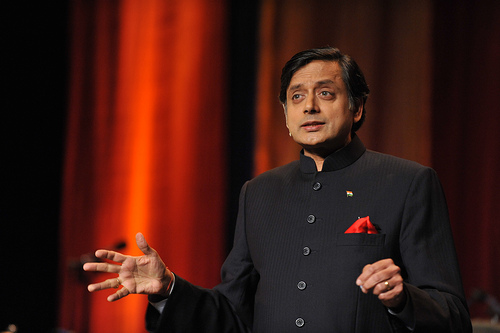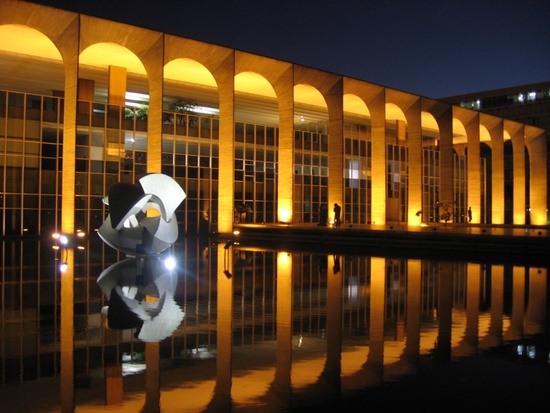In late 2011, during a meeting in Delhi with former Minister of State for External Affairs Shashi Tharoor and several Indian diplomats, one speaker thanked Tharoor for helping India’s Ministry of External Affairs “begin to understand how to use social media and engage civil society.” The number of followers of the Ministry’s twitter account was still low, he conceded (it currently stands at 79,800). Shashi Tharoor’s personal account, by contrast, boast 22 times as many followers, currently standing at 1.75 million, making him one of the most popular politicians of our time. What seemed certain to the diplomats present was that India’s foreign policy establishment needed to do more to engage civil society – through a savvy social media strategy, a transparent organizational structure, and a professional team of public relations officers. How else would the Indian government win public support for complex foreign policy strategies, such as building up its military presence in the Indian Ocean, seeking stronger ties with former enemy China, and drum up global support for UN Security Council Reform?
A similar debate is taking place in Brazil, another emerging power that seeks to play a greater role on the international stage. Just like in India, foreign policy makers at Itamaraty, the Brazilian Foreign Ministry, grapple with convincing civil society that Brazil should turn into a global actor strongly involved in many issues around the world. Yet quite to the contrary, foreign policy plays only a marginal role in Brazil’s bustling public debate. Itamaraty’s greatest projects are often greeted with a mixture of neglect and rejection by both the media and public opinion.
In 2010, when President Lula traveled to Iran to negotiate a nuclear deal with President Ahmadinejad, most public opinion makers harshly criticized the decision, and several colleagues disapproved of my article defending the trip (Lula’s weekend trip to Tehran: worth a try). Brazil’s strategy to strengthen ties with Africa and the Global South in general is often falsely termed as a purely ideological endeavor (although it has slowly been accepted by the political mainstream). As I wrote recently, the vast majority of civil society, media and academia in Brazil remain skeptical of the BRICS concept, one of the governments most innovative strategies to diversify its partnerships and press for reform of global governance. Finally, one of Brazil’s most ambitious long-term projects, UN Security Council reform (and its inclusion as a permanent member), is generally seen by Brazilian citizens as a quixotic, amorphous and uninspiring elite project.
To some degree, this is natural. Brazil has not traditionally played a great role in the international arena. Only a few decades ago, the number of Brazilian embassies around the world was relatively small compared to the 139 embassies it boasts today. The notion that Brazil has an important role to play in the Middle East would have seemed outlandish in the 1990s, when Brazil was just beginning to consolidate economically and politically. Brazilian university students and young professionals are the first generation that feels comfortable with an internationally active Brazil, deeply involved in distant regions that have virtually no discernible impact on daily life in Brazil.
Hence, it seems to be only a question of time until public opinion in Brazil will get used to ever more ambitious foreign policy strategies. At university level, this is already happening: There are more than 100 undergraduate courses in international relations. Yet Brazil’s Foreign Ministry can surely do more than sit by idly and wait for the new generation to take over. This is what Matias Spektor argues in a thought-provoking op-ed in Folha de São Paulo, one of Brazil’s leading newspapers. He partly blames the shallowness and relative absence of foreign policy in Brazil’s public debate on Itamaraty’s unwillingness to engage and actively try to shape public opinion. Rather than interact with the press, Spektor argues, Brazil’s Ambassadors are told to keep a low profile – which facilitates the spread of false rumors and misinterpretations by often uninformed journalists. He rightly notes that too many times, writers consult the international media rather than contacting the Foreign Ministry. In the past, this has caused problems: When Brazil negotiated with Iran, Itamaraty did not provide enough information to the national media, which allowed a US-inspired narrative take hold that Brazil was misbehaving dangerously.
Under Foreign Minister Patriota, Itamaraty has made unprecedented attempts to engage civil society, often inviting NGO representatives and academics to seminars. Patriota, who spends 40% of his time traveling abroad, frequently speaks at universities across Brazil and participates in policy discussions at think tanks, such as one about the “Responsibility While Protecting” at FGV in Rio de Janeiro last year.
Yet Spektor also points out that Itamaraty needs to use Twitter and Youtube in a more engaging way. Interestingly enough, Itamaraty’s twitter account has almost exactly as many followers as that of the Indian Ministry of External Affairs – quite an achievement, considering that Brazil’s population is more than five times smaller than India’s.

Shashi Tharoor
And yet, India’s civil society seems to be more supportive of India’s global aspirations than in Brazil. There are structural factors that can explain this, ranging from India’s complex neighborhood, relatively recent wars with Pakistan and China, and an English-speaking elite that can more easily network its way around the world. India also boasts a think-tank culture that produces a yearly avalanche of foreign policy position papers and books that strengthen the public debate. But India’s foreign policy makers have also done their bit. Shashi Tharoor himself symbolizes India’s growing global engagement. His recent book, “Pax Indica”, succeeded in engaging readers who had previously cared little about foreign policy. Tharoor’s TED Talk about India’s rise was watched over 600,000 times the world over, strengthened the domestic debate about India’s role in global affairs, and is even said to have inspired many young Indians to attempt to enter India’s diplomatic service. Itamaraty surely has enough talented diplomats to follow Tharoor’s example.
Read also:
Book review: “Pax Indica” by Shashi Tharoor
In Brazil, civil society and academia remain skeptical of the BRICS concept
How many diplomats does an emerging power need?
Photo credit: 1- xenïa antunes
2-TED









